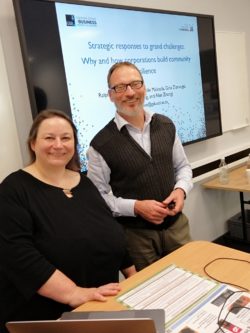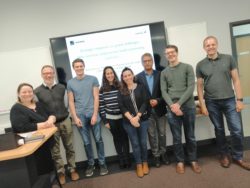It's not about the rains, it's about the drains!
Professor Diane Holt from the Centre for Enterprise and Entrepreneurship Studies was delighted to welcome Professor Ralph Hamann of the University of Cape Town for her first Seminar as Chair of the Centre. Professor Hamann presented to staff from the Business School, the School of Law and from sustainability.
His topic focused on “Why and how do corporations seek to build community resilience?” His paper, co-written with colleagues Lulamile Makula, Gina Ziervogel, Clifford Shearing and Alan Zhang is currently under review. Their work explores how some corporations are adopting place-based strategies to help communities to adapt and respond to economic and environmental issues. Some large South African corporations have realised that although they can’t do anything about climate change at a macro-level, they can work with partners such as the Partnership For Risks and Resilience Initiative, the Embedding Project and the World Wildlife Fund to support place-based strategic initiatives that build resilience.
By corporations supporting the local fire service financially, everyone locally benefits from a better fire service.
During the academic research, Ralph and his team discovered that although local farmers are very efficient in their use of water, the problem was further upstream – some where the farmers had no control over. One example of inefficient use of water is ‘alien vegetation’, plants that use up to 30% of the valuable water in the ground. By working with local municipalities to address this challenge at a landscape level, this water scarcity issue is being tackled in a way that is showing real on-the-ground results.
Likewise, corporations have realised that although they can’t stop the fires, they can contribute financially and help improve the fire service – so the fires that will inevitably start, will be dealt with more quickly and facilitating a better fire service for everyone. The study has also looked at those corporations who have chosen not to participate in such local initiatives, and what benefits they have gained from the other organisations’ work.
Ralph Hamann is Professor and Research Director at the UCT Graduate School of Business, and he holds a Research Chair at the UCT African Climate and Development Initiative. He teaches on business sustainability, social innovation, and cross-sector collaboration, and he is an executive editor of Environment: Science and Policy for Sustainable Development. Among his other roles, Ralph is founder and academic director of the Network for Business Sustainability (South Africa). He is also co-founder and chair of the Southern Africa Food Lab, for which he received UCT's Distinguished Social Responsiveness Award.


